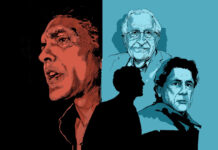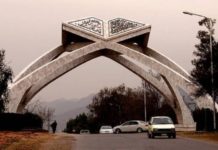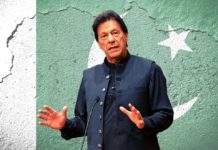Disclaimer: The Eqbal Ahmad Centre for Public Education (EACPE) encourages critical and independent thinking and believes in a free expression of one’s opinion. However, the views expressed in contributed articles are solely those of their respective authors and do not necessarily reflect the position or policy of the EACPE.
Abstract
Pakistan is performing poorly in terms of educational quality. One of the main reasons for this is lack of critical thinking amongst students. This paper explores into causes of monolithic thinking amongst students at various levels of education in Pakistan. A two layered analysis is used here to investigate into the systemic and institutional variables responsible for inculcation of monolithic culture at educational institutes. This paper questions not only the state narrative on fundamental purpose of education but also the existing recruitment, curriculum development and pedagogical practices. It is argued here that only separation of ideology and education can lead to improve education standards in Pakistan.
Introduction
Plato, in one of his most popular works ‘The Republic’, asserted:
“Education does not mean storing up of external knowledge rather it is bringing human soul into its right position for its proper realization.”
Consciousness about the goal of education set by Plato centuries ago has not yet been realized in Pakistan. Education has been used as a powerful tool for indoctrination, preserving status-quo and determining power relations in the society. At the place of enlightened individuals and vibrant students with strong values of critical thinking, educational institutes in Pakistan produce copycats. All this have given birth to a system where authority remained unquestioned and unchallenged, status-quo is preserved and disempowered are consistently exploited by the powerful.
There is dual impact of existing education policy in Pakistan. On one hand it has stagnated the process of social progress, to the benefit of a limited elite, while on the other it is responsible for the various failures of Pakistani state at political, economic and foreign policy fronts, to the disadvantage of all. This paper explores into the roots of monolithic thinking amongst students at various levels. It investigates into the broader educational policy narrative of the state, discusses systemic, structural and pedagogical issues and analyses the existing academic discourse as well as suggests a reform agenda.
Roots of Monolithic Thinking
Monolithic thinking here means thinking in a linear direction, perceiving reality in a narrow sense and taking sweeping and absolutist stance in opinions and judgments. There are numerous causes of development of such minds in any society. The focus of this paper is to discuss the roots of monolithic thinking amongst students at higher education level in Pakistan. The succeeding discussion highlights the impact of politics, broader contours of education policy and existing pedagogical practices on the thinking abilities of students.
-
Historical Cause: Evolution of State Narrative
Modern day societies have become very complex. There has always been interplay of various variables at different institutional levels resulting into broader cultural evolution of the society. Culture in public domain often reflects the long standing held beliefs of the dominant classes. It is, therefore, pertinent to evaluate and analyze the systemic narratives and worldviews in order to develop insight into cultural realities of various sub-systems. Education, being one of the most powerful agents of social control, is used by states to produce organic intellectuals in authoritarian and semi-authoritarian societies. Keeping in view these theoretical considerations this paper critically analyzes the systemic cause of evolution of a particular narrative on education policy in the first section of this paper.
At systemic level over reliance of state on religion in order to cope with the challenges of centrifugal tendency in its federating units, to ensure overly centralized system, to seek leadership of Muslim states for the purpose of balancing a many times larger hostile neighbor India, to keep the secessionist struggle alive in Indian occupied Kashmir and to serve as United States frontline against Soviet Union till the disintegration of the later, led Pakistani establishment to design an education policy that encouraged not only Political Islamists but also helped it to patronize private Jehad in Kashmir and Afghanistan. From objectives resolution to Islamization drive of General Zia the state remained committed to use of religion for legitimizing its internal and external policies.
The constituent assembly deviated from Jinnah’s guidelines and adopted Objectives Resolution thereby laid foundations of a theocratic polity.
National discourse in Pakistan stems out of the values inculcated in the society through national curricula in the schools, colleges and universities. Courses of Pakistan Studies and Social Studies are developed with an aim to nation building on religious rhetoric. Pakistan movement is interpreted as a struggle for the establishment of an Islamic State with Sharia law. Jinnah’s oft-quoted statement that ‘We do not demand Pakistan simply to have a piece of land but we want a laboratory where we could experiment on Islamic principles’,[1] is not only part of syllabi but also flashes on television screen on PTV in prime time hours. The rationale provided for Muslims’ struggle for freedom, in text books, and separate homeland, is based on ”two nation theory”. Pakistan is declared as an ideological state whereas its ideology is referred to as nothing else but Islam.
Politico-historical causes of development of this narrative need a careful investigation. Islamic State Narrative originated and evolved during the freedom struggle for two purposes: firstly, to gain mass support for Muslim league and build a separate Muslim identity and secondly, to create a distinction with other claimants of the Muslims’ representation like Jamee’at Ulma’ Hind, Khaksars and Ahrars. The discourse developed during pre-partition Muslim League’s struggle emerged as hegemonic discourse in the post-partition period. This was the reason that Jinnah’s address to the first constituent assembly had little impact on the constitution making history of Pakistan.[2] One of the main issues that surrounded constitution making history was the question of nature of state and constitution. The constituent assembly deviated from Jinnah’s guidelines and adopted Objectives Resolution thereby laid foundations of a theocratic polity. Objectives Resolution was made preamble of all the three constitutions and the future constitutions of 1956, 1962 and 1973 reflected the implications of same discourse that was developed during pre-partition freedom struggle.
In the post 1970’s Pakistan three factors greatly contributed in establishing the hegemony of Islamic State Narrative. Firstly, the secession of East Pakistan on one hand brought Pakistani establishment closer to the religious political parties, particularly Jam’at e Islami , while on the other it greatly contributed to an increased reliance on using religion as a tool to suppress centrifugal tendency in smaller provinces.
Secondly, it contributed to strengthening of Indian threat perception that resulted in an increased aspiration to develop intimate relations with Muslim states for balancing Indian threat. It led Pakistan to enter into more cordial relations with Gulf countries in general and Saudi Arabia in particular. Saudi’s obsession with expansion of its own brand of Islam resulted into its funding for the offshoots of Wahabi Islam in Pakistan, which ultimately fueled Shia–Suni differences and sectarian violence on one hand while Wahabisation of academic discourse on the other.
Thirdly, Soviet intervention in Afghanistan and start of American proxy war in the garb of Afghan Jehad, and general Zia’s Islamization drive in order to ensure supply of human resource for the said Jehad led to further consolidation of hegemony of Islamic State Narrative. Zia’s period is characterized with propagation of Jehadi literature. Curriculum was widely revised while media was blatantly used to Islamize the society.
Till 9/11, 2001, Islamic State Narrative remained an un-challenged discourse in Pakistan. A whole new generation reached to its adulthood indoctrinated with political Islamist thought. The start of American war on terror and Pakistan’s compulsion to take a front line role in this war created a paradoxical situation for Pakistan. It had not only to divorce its previous allies, political Islamists, but it was also entrusted with a responsibility of developing a new discourse harmonious with its systemic policies, developed under its new international compulsions.
General Musharraf’s response to the need of an alternative narrative was ”Enlightened Moderation” and ”Pakistan first”. Some half hearted steps at systemic level were also taken like patronizing marathons and initiating women rights bills as well as an increase in the number of female representatives in national and provincial assemblies, but Musharraf’s narrative failed to challenge hegemony of ”Islamic State Narrative”. Neither academic discourse revised, nor was decades old way of strategic thinking altered. His approach to problem solving remained superficial. He presented dilemma of a typical Pakistani urban elite class mindset; aspiring to fly with West but shackled in the cage of tradition and culture.
Failure of ”enlightened moderation cum Pakistan first narrative” led to emergence of another narrative; Takfiri cum Kharji narrative. Those militants who were challenging the writ of the state were declared as ”Takfiri and Kharjites”. If analyzed closely this narrative was not an alternative to ”Islamic State Narrative” rather it was a good supplement to the hegemonic ISN.
Internal contradictions of TkN are causing it to fail. Both ISN and TKN emerge out of the same myth. The myth is rooted in the primary belief of distinguishing Islam from rest of the religions. The proponents of political Islam declare ”Islam” as Deen; a category distinct from other religions. It is widely believed that Islam cannot flourish in subjugation and it is destined for dominating the world. It is duty of every Muslim to struggle in the path of almighty for the establishment of a global Islamic state. There is no distinction of religious and secular, as well as spiritual and political. The ultimate aim of a Muslim majority is to establish supremacy of Sharia law and a Muslim minority to preach and convert majority into Islam and go for the same aim.
Prophet Muhammad’s life in Mecca and Medina is interpreted in terms of his political goals. The rule of first four caliphs is termed as golden period of Islam and it is believed that the same system will be resurrected before doomsday. Throughout history Muslim’s rule is termed as Islamic rule and causes of Muslim decline is believed to be Muslims abstaining from the teachings of Islam. History is believed to be a continuous struggle between good and evil; whereas Muslims always standing on the side of good.
These myths and historical metaphors define a common Muslims mindset in Pakistan. The discourse of political Islam is developed on these myths and this discourse ultimately enforced through academic indoctrination that caused particular systemic policies and social values finally leading Pakistan to existing litany.
Pakistan’s obsession with ISN at systemic level influenced developments at various subsystems. Education is one such subsystem which is not only influenced by ISN but it remained a major tool for strengthening the hegemony of this narrative. The next section includes discussion on how this state narrative influenced the academic culture in educational institutes.
-
Recruitment, Curriculum and Pedagogy
The societies where education is priority and used as an agent of social change and progress the process of recruiting teachers is very competitive there. Teachers are tested at multi-levels in order to evaluate their competence, communication skills and aptitude. The process of recruiting teachers in Finland, being the number one ranked education system worldwide, is noteworthy:
Finnish teacher education programs are extremely selective, admitting only one out of every ten students who apply. The result is that Finland recruits from the top quartile of the college-bound cohort. Applicants are assessed based on their upper secondary school record, their extra-curricular activities, and their score on the Matriculation Exam, which is taken at the end of upper secondary school. Applicants must also take the Vakava entrance exam, a take-home, multiple-choice exam that assesses their ability to think critically and evaluate arguments in the education sciences. Once an applicant makes it beyond this first screening round, they are then observed in a teaching-like activity and interviewed; only candidates with a clear aptitude for teaching in addition to strong academic performance are admitted.[3]
Although teachers are paid a little less as compared to other professions yet they enjoy great respect in the society. Justin Snider asserted:
Teachers in Finland can choose their own teaching methods and materials. They are experts of their own work and they test their own pupils. I think this is also one of the reasons why teaching is such an attractive profession in Finland because teachers are working like academic experts with their own pupils in schools.[4]
The dynamism of educational narrative of Finland is precisely explained by her Education Minister Ms Virkkunen in an interview with Justin Snider. She asserted:
Our educational society is based on trust and cooperation, so when we are doing some testing and evaluations, we don’t use it for controlling [teachers] but for development. We trust the teachers. It’s true that we are all human beings, and of course there are differences in how teachers test pupils, but if we look at the OECD evaluation — PISA, for example — the learning differences among Finnish schools and pupils are the smallest in OECD countries, so it seems that we have a very equal system of good quality.[5]
Most of the text books of natural science starts with various verses of religious scriptures and an attempt have been made to harmonize scientific theories with religious assertions.
Unlikely, despite political rhetoric education never remained a top priority in Pakistan. The purpose of educating never remained producing dynamic individuals. Like other authoritarian security states the goal of education has always been to inculcate loyalty and patriotism among students. All this led to inefficient recruitment policies for recruiting teachers at different education levels. As education remained one of the largest job markets, therefore, teachers are recruited in order to give employment to the large unemployed youth bulge. Being least attractive in terms of financial privileges and respect in society the profession seemed to be least competitive and last option for educated individuals as compared to other professions. It is often used as a first step of career ladder where people join, prepare for competitive exams in order to jump to other lucrative jobs, and leave it if they get a chance. Lack of passion, missionary spirit and aptitude for teaching and least consideration of these characteristics while devising recruitment policies have led Pakistan to existing intellectual bankruptcy.
Curriculum development is another important area where lack of professional expertise, innovation and state regulation in terms of drawing boundaries to limit the free flight of thoughts amongst students has caused such academic culture which discourages critical thinking. ‘‘The existing training programs provide little exposure in this area, and the teachers’ academic qualifications do not necessarily contribute to curricular creativity.’’[6] Intermixing of ideological and academic discourse takes away the chance of studying natural and social sciences as science. Most of the text books of natural science starts with various verses of religious scriptures and an attempt have been made to harmonize scientific theories with religious assertions. This ultimately leads the learners to believe that the basis of scientific knowledge is religious. Such beliefs about science restrict the students to think out of box, question the validity of scientific theories and think innovatively.
The dilemma continues with social science. Social science subjects particularly Pakistan Studies, which is a compulsory subject till graduation level, is used as a major tool to indoctrinate students with a particular version of religious ideology. It not only contains distaste for diversity but also includes hate speech against minorities[7]. The subjects of Urdu and English language have been made additional supplement for teaching Islamic Studies. History focuses little on history of Indus valley civilization and more on Arab-Muslim history. Some very important subjects like Philosophy and Anthropology have disappeared from colleges.
Along these issues of curriculum and text book developments the teaching pedagogy is also part of the problem. Classroom experience suggests that lectures are more like one way sermons. A teacher usually speaks out the contents of a course and students are supposed to note, listen and reproduce in examinations. Questions are often discouraged in the name of class discipline. Least interactive class culture is a norm in most of the educational institutes. Intermixing of ideological and academic discourse also features the lectures to validate the arguments and restrict questions in classrooms. The classroom arrangement is also arranged in a way where teacher stand out on high intellectual pedestal and students are always on receiving end. Teachers talks in absolutes and inculcates monolithic thinking in students as a result. Any disagreement on the part of students is believed to be unethical.
-
Broader Contours of Reform Agenda
Reforms in the following areas are pertinent in order to inculcate critical thinking amongst students as well as to enhance overall educational standards in Pakistan:
-
The state should review its narrative on purpose of education. There is need of separating education and ideology. This objective can only be achieved through extensive trainings of educators, their exposure to international academia and institutions and overhauling of educational policy. Some radical reforms are needed in curriculum development as well as improvement in text books is also call of the time. A grand dialogue on education reforms may be initiated at national level for the aggregation and articulation of diverse opinions on education reforms.
-
Budgetary allocation for education needs radical increment and recruitment process should be made more competitive. Only prioritizing education as top agenda in national policy can improve the standard of education.
-
Researches on classroom experience of students should be encouraged. Students should be made important stakeholders. Student unions should be allowed and encouraged.
-
State needs to re-evaluate its position on various international and domestic issues. Not only its India centric foreign policy needs revision but also its symbols of honor and pride need change. Symbols of ideological security state should be replaced with the intellect and art Pakistan produced during its 70 years of history.
-
An overall culture of accommodation and pluralism should be inculcated in the society using not only text books but also other popular means of propaganda like print, electronic and social media. Only a democratic culture and propagation of democratic values from broader society to educational institutes could create conducive environment for critical thinking amongst students.
References
[1] Muhammad Ali Jinnah, 1946 at Islamia College, Peshawar (retrieved from here)
[2] “You are free; you are free to go to your temples, you are free to go to your mosques or to any other place or worship in this State of Pakistan. You may belong to any religion or caste or creed — that has nothing to do with the business of the State.” (Presidential Address to the Constituent Assembly of Pakistan on 11th August, 1947)
[7] Hindus are presented as genetically conspirators in some text books of Pakistan Studies.
About the Author
Dr. Adil Khan has doctorate in Politics & IR from International Islamic University, Islamabad. He is Editor in Chief of Gandhara Journal of Research in Social Science and Information Secretory of Professors’ Association for Students’ Services (PASS) Mansehra, Pakistan.









No mention of literature as an important subject.In this country it is seen as a ‘useless’ subject unlike the ‘useful’ ones like Economics and Accounting. The fact is that literature acquaints us with the human condition,encourages the growth of empathy and imagination which distinguishes us from other living creatures.Read Shakespeare,read Ghalib and you will see yourself in their writings.You will look on others from a dual or multiple perspective,make you aware that every thing is complex and that you cannot be judgemental.
Thanks. You filled the gap. Agreed